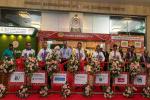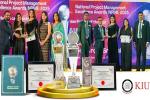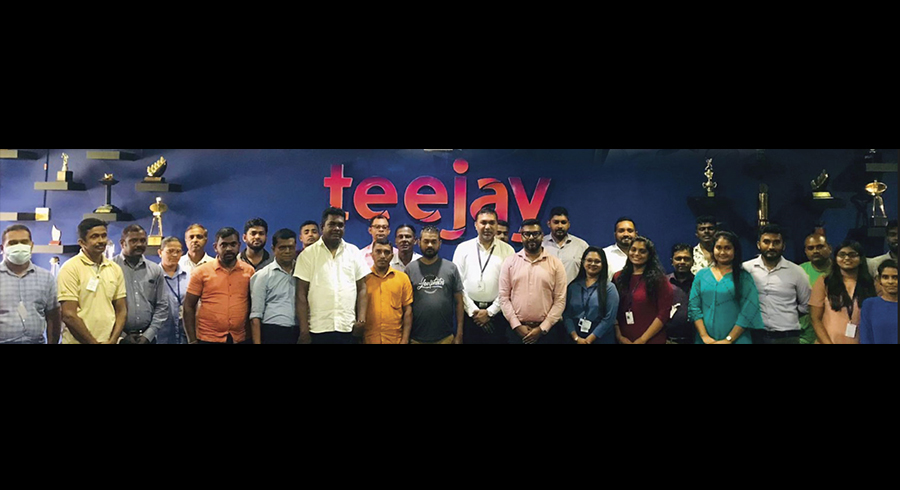Remaining well ahead of the curve, the textile industry has focused on circularity through sustainability compliance, innovation, global best practices, and integrated systems and processes that reflect green business models. This industry has showcased a manufacturing culture that goes beyond compliance.
Teejay Lanka PLC, one of the largest textile manufacturers and a role model for circularity in the industry, has embraced a model of reduce, reuse, recycle, renew, and regenerate the solid wastes since its inception, aiming to move towards 100% value addition to waste.
By integrating the principles of circularity into its business, Teejay Lanka PLC ensures that resources and products used in the value chain are utilized, recycled, composted, and reused, reverting into a new lifecycle or returning to the supply chain.
The Company’s commitment to a green future is highlighted by notable achievements including being the first textile manufacturer in Sri Lanka to receive membership in the US Cotton Trust Protocol and the first in the industry to develop green fabric.
Transformative Measures for True Circularity
Elaborating on the Company’s continuous pursuit of circularity, Teejay General Manager of Engineering and Sustainability Edga Melan notes,
“Circularity in apparel is an ambitious goal.
But if we are able to accomplish this in apparel, then any industry can adapt to more sustainable models of production.
This is the reason we constantly strive to intervene in the production process when inefficiencies, waste, or unproductive practices are identified.
By maintaining our focus on circularity principles, we can restructure and revamp stages in the production process and further our goal of adopting a low-impact, circular production process."
A study conducted by Cambridge University in 2022 estimated that Sri Lanka’s textile industry produces 30,000 tonnes of waste annually and being a key player in the industry, Teejay Lanka recognizes the urgency to address waste management challenges.
Edga emphasizes that waste reduction goes beyond achieving zero waste.
“We focus on effectively measuring and managing waste by quantifying at each production processes in relation to fabric output.
This approach enables the identification of improvement opportunities and sets the stage for sustainable waste management.”
Honing Comprehensive Waste Management Protocols
Teejay has adopted a comprehensive waste management approach that encompasses waste segregation, extended disposal networks, and supplier responsibility.
Recognizing the need for immediate action, Teejay implemented a solid waste management policy that outlines stringent guidelines for waste disposal.
Waste collectors, including individual entrepreneurs, SMEs and individuals, also play an integral role in Teejay's waste management ecosystem.
Through the Waste Collectors' Forum, Teejay promotes knowledge sharing, appreciation and inclusivity.
The Waste Collectors' Forum serves as a platform for waste collectors to share best practices and align with Teejay's waste management policies.
This initiative has proven to be groundbreaking, as waste collectors often operate in the shadows without recognition or involvement in organizational forums.
Drawing inspiration from international sustainable best practices, Teejay recognizes the importance of establishing open platforms for discussions on sustainability programs, ideas and integration into Sri Lanka's infrastructure.
These forums can create significant positive impacts on the economy, prompting action to initiate them.
Teejay's recognition of the waste collectors' role in the supply chain empowers them and emphasizes their contribution to sustainable waste management.
Moreover, this forum serves as a catalyst for the exchange of innovative and efficient waste management practices among industry stakeholders.
Collaborative innovation for a greener future
For Teejay, sustainability is both a competitive edge and a collective necessity that requires cross-industry collaboration.
By collaborating and sharing best practices, companies can comprehensively analyse the value chain, aligning with the EU's push for sustainability across supply chains.
The Company adopts a cradle-to-gate approach in waste management, taking responsibility for waste disposal until it exits the factory premises.
This extended supplier responsibility ensures proper handling of waste beyond Teejay's boundaries.
Teejay's commitment to waste reduction extends to the creative reuse of plastic barrels.
By recycling these barrels, Teejay has reduced solid waste by a remarkable 3,960 barrels annually.
To put the saving in perspective, stacked on top of each other, this would be equivalent to approximately 1.4 times the height of South Asia’s tallest building, the Lotus Tower.
The plastic barrels are converted into innovative applications including recycled pipes, flowerpots, electrical enclosures, conduit accessories, etc.
The Company also demonstrates its commitment to sustainability by repurposing fly ash from coal, a by-product of its thermal energy generation, as a valuable substance for organic fertilizer, maximizing resource efficiency and minimizing waste in the production process.
In addition to the initiatives above, Teejay introduced an sustainable waste disposal method where the Company converts its daily output of wet sludge into dry powder which is then used as a material substance for cement manufacturing.
This has resulted in 81% reduction in Greenhouse Gas (GHG) emissions at its factory located at the Seethawaka Export Processing Zone (EPZ).
Forging a path to collective circularity
As the industry adapts to a future driven by sustainability, Teejay Lanka PLC is emerging as a trailblazer in pioneering waste management practices to mitigate environmental impact and contribute to a greener world.
However, Edga emphasized the need for cross-industry collaboration, along with intra-industry collaboration, to collectively move towards a more sustainable future.
This collaboration will facilitate the implementation of sustainable practices across Sri Lanka's infrastructure and foster ground-breaking projects that revolutionize the country's sustainability landscape.
“With EU legislation coming into play, it is essential for all Sri Lankan apparel companies to prioritize traceability and transparency in the manufacturing processes by inculcating ethical business practices.
By integrating digital traceability tools and ensuring accountability, we can credibly verify our progress and prove that we really are meeting consumer demands.
At Teejay, we are committed to meeting our circularity goals by leveraging innovation and cross-industry collaboration.
By working towards collective sustainability, we can maximize our resource efficiency and show the world a better way to produce apparel."























